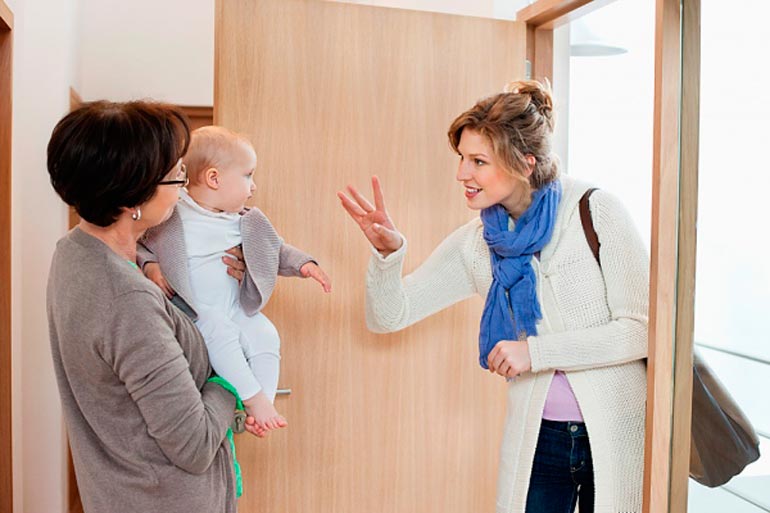It is difficult to say why this is happening - but often we, adults, suddenly find ourselves mistaken in the norms of raising children. Whether our own attitudes from childhood influence us, or whether we lack confidence in our own competence ... However, it’s worse when we don’t catch it. Or when we understand our mistakes only at the stage of causation.

How to distinguish internal principles from stamps in consciousness? Unlike true traditions, pedagogical myths prevent parents from hearing their own intuition, which means understanding their child. Acting through fear, and not through love, some stereotypes can destroy the harmony of parent-child relationships. But it was not there! Together we will debunk some myths right now.
“The caregiver himself must be what he wants to make the caregiver.” ―Vladimir Ivanovich Dahl
MYTH number 1. “If you give him everything he wants, he’ll spoil himself and sit on his neck”
Think about what your child wants first. If the first to come to mind, say, is a bicycle, then we still pedaled in the wrong direction. In fact, the main need of every baby is the need for love, and more specifically, to know that they see and hear him. Giving him what he wants in this sense is impossible to overdo. And no matter how rosy the brains of grandmother’s walks rosin: “Don’t get your hands on it! Do not take the baby out of the crib once again! ”, A happy child is a child who has“ sat up ”in his arms. He is not at all “manual” at the senior preschool age - after all, basic needs are met on time and there is no fear of losing love.
If we talk about “everything that he wants,” bearing in mind the abundance of toys and entertainment, he must understand here - it is important that we invest in these benefits. For comparison, we give three examples:
- Parents pose with a child out of guilt - around the clock at work and have no opportunity to express their feelings in a different way.
- Buy toys, not withstanding demanding hysterical.
- The family has many relatives and friends, close people bring presents to the child.
Each situation is individual, but the “possible risks” as such are created not by the “sea of toys”, but by the context of their abundance. If the context is a healthy relationship in the family, an excess of toys and children's joys is unlikely to adversely affect the baby.
We also read: how many toys does a child need
A separate tale is when parents use the prohibitions for educational purposes, always and for all fear of spoiling.Often the child has no choice but to become trickier - stop asking for permission, for example. It is here that parents begin real difficulties in education. In another child, this can cause the so-called “learned helplessness” - a problem that causes lack of initiative in various aspects of adult life.
We also read:Little manipulators: how to respond to the tricks of the child? 10 most successful childhood phrases
MYTH No. 2. “You can’t be sorry for any little thing - it will grow crybaby”
When an adult is upset, we sympathize with him - we share heavy feelings, demonstrating understanding and acceptance. But baby, it turns out, not a man? Yes, children's adversities do not look so widespread, but that’s why he is a child. Do not throw it in difficult times! But do not worry more than himself. The ability to feel, not reproach yourself for negative emotions is something that many adults lack, due to improper upbringing. May our children be happier than us. You will notice how, as you grow older and develop the psyche, a little person will need less empathy to stop crying.
A simple example from real maternal experience: Vanya is a susceptible child, his grandmother even calls him “sissy”, but his mother sees progress - now in a year he could cry for every little thing (under the ooh and aha of a caring grandmother who thinks it would be worth it for mom treat him “like a soldier), and my mother felt sorry, expressed sympathy. No worries, no nerves - just with understanding in the soul. And now he is 2 years old. In vain did the grandmother worry - no more, but much less he cries, and calms down much faster. And he’s not a crybaby - yes, he’s a man of fine mental organization, but each child has his own character. Vanya does not cry over trifles. By the way, if more recently, in response to a call-up cry "I hit!" if you had to take it on your hands, peck a bruised place and give a chest, then six months ago everything had become much easier. And the other day he was so carried away by the game of toy soldiers that, having hurt himself with his knee, he kissed her and continued his important business.
We also read: How to raise and raise an optimistic child? Tips for Parents
MYTH No. 3. “Going away with crying is a mockery. If you need to go away, get away imperceptibly! ”
Well, where is the logic? Yes, quietly leaving, taking advantage of the child’s enthusiastic game, we won’t hear bitter crying, but is this not a real mockery of the child’s soul? Moreover - this is a spit in the soul! Put yourself in the place of the child: mom disappears unexpectedly, at any moment. Well, and how then to trust her? How many times a day just in case to cry, having lost her from sight? Or maybe in the middle of the night it’s worth waking up and calling her? No, well, you never know ... Absolutely always need to be on the alert in this unstable world where people are deceiving each other.
Warning, explaining, patient parents are much less at risk for the mental state of their children.
Another example: when Alice was a year old, her mother had a need to earn extra money - there was no dad in the family. Grandmother was called to sit with the baby, the good they lived together. And here quarrels began: the grandmother believed that mother should leave imperceptibly. Once they did so, though that day the grandmother’s forces didn’t last long - Alice cried until her mother had to drop everything on her grandmother’s call and run home. It seemed that part-time mom does not shine. But no - having changed the strategy, women soon noticed that the girl was crying less after her mother’s departure, and her disappointment did not last so long: after all, her mother had promised her to come back, because she already had that — she promised and really was returning.
We also read: The child does not let his mother go a step away: what to do?

MYTH No. 4. “Politeness must be instilled from the cradle!”
"Did you say thanks?" - a question for a one-year-old child, to put it mildly, inappropriate.But how much value we can attach to this almost from the cradle! “Do not raise children - they will still be like you” - remember this statement as often as possible and do not train the baby. Better pay attention to your own politeness - and not only with a child. Well, treat the baby as an a priori open, sincere creation. If on the street, walking by the handle with parents, a two-year-old tomboy will meet, say, a teacher and not say hello, but begin to cry and hide behind his mother, instead of a thousand words, this will not mean his impoliteness, but how he is treated in kindergarten . Then you decide how to deal with the exposed truth. The main thing is to hear and feel the baby. And he will learn to say “thank you” and “please” using your example.
We also read: Comfortable baby. Is obedience always good?
MYTH No. 5. “Parenting does not happen without punishment”
When parents are not tuned to the inner world of the child, they do not understand the motives of his behavior. Both good and bad. So there are no humane tools of influence left - only manipulations, threats and punishments. Be an assistant and not an overseer: contact your inner child and he will explain almost any situation to you. Unless, of course, you are at peace with yourself (your inner child should sincerely wish good, and not avenge his own childhood - this happens when we act impulsively and then justify ourselves). Punishment is not needed. Or, at least, they will no longer look like an outpouring of the anger of an adult towards a small one.
We read on the topic of prohibitions and punishments:
- To punish or not a child for accidental misconduct?
- 8 loyal ways to punish children. How to punish a child for disobedience
- Why you can not spank a child - 6 reasons
- 15 signs that you are too strict on the child
- What can and cannot be forbidden to a child
Alas, in our childhood with you, largely out of ignorance, the concepts of “education” and “punishment” were almost synonymous. “Mom does not scream - mom brings up!”, “Dad has one cure for all your vagaries - vitamin er (belt)!” - remember such statements? For some reason, it was believed that without this we would grow up spoiled, uncontrollable, and generally unacceptable to society. Now we are forced to break the stereotypes that have infiltrated our minds under the influence of our parents. This must be eradicated both at the level of consciousness and at the level of reactions and impulses. The child obeys without any compulsion when he feels that his parents are always on his side, tuned in to him and is in complete interaction with him. And it's really awesome!
We read on the topic of education:
- 7 discoveries that every woman will make by becoming a mother
- Features of the psychology of parenting up to a year
- 7 parenting mistakes that prevent children from succeeding
- Top 10 Parent Mistakes in Parenting
- How to raise a child in peace of love - 25 main tips
5 principles of positive parenting









If you want to raise a child well, study the works of Shalva Amonashvili. Look at his exhaustive interview with Vladimir Dovgan, where the principles of education are discussed in detail for 2 hours. In short: from childhood, you need to treat the child as an adult, love him and discover a teacher in himself.
I agree with the author of the article. I always try to talk with the child in order to understand the motives of his actions. It bears much greater fruit than punishment. And I always try to behave impeccably with a child. After all, he takes an example precisely from our actions, and not from our words.